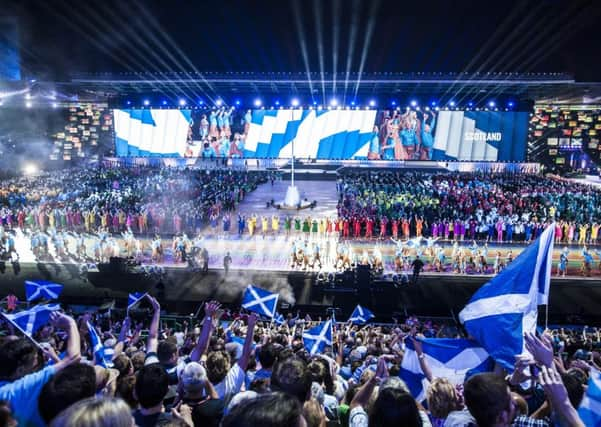Glasgow and Gold Coast seek lasting benefits from Commonwealth Games


When the Games begin on Wednesday there will be endless comparisons, both sporting and emotional, with 2014. Team Scotland arrive in Australia with the challenge of improving on the record-breaking 53 medal haul achieved on Clydeside.
There will be plenty of familiar faces for Scottish supporters cheering on from back home. Of the 26 athletes in the track and field section, 19 competed four years ago.
Advertisement
Hide AdAdvertisement
Hide AdScottish athletics has enjoyed a strong 12 months and there is a quiet confidence in the camp.
At the 2017 World Championships in London there were a record 16 Scots on the British team, captained by Eilidh Doyle, who will compete for a third successive Commonwealth Games medal over the 400m hurdles.
Doyle’s fellow Glasgow medallists, 800m runner Lynsey Sharp and hammer thrower Mark Dry, will also be looking to repeat their podium finishes.
For one track legend, there’s no doubt the Glasgow Games helped boost elite performance north of the Border.
“We have a great team of strong world class athletes,” said Liz McColgan, who memorably won gold in the 10,000 metres at the 1986 Commonwealth Games in Edinburgh. “We are stronger than 2014 as more believe in their ability to medal.
“I think for participation, development in Scottish athletics within the club system, and providing successful sporting role models, Glasgow has left a legacy.”
But not everyone is convinced of the wider benefits. Holyrood’s health and sport committee warned in November there was “no evidence of an active legacy” among average Scots.
Participation figures have remained stagnant over the past decade, while the proportion of adults meeting the recommended amount of physical activity per week – 150 minutes of moderate intensity or 75 minutes of vigorous intensity – was at only 63 per cent in 2015. This compares to 64 per cent per cent in 2012, the earliest year for figures using this method of measurement.
Advertisement
Hide AdAdvertisement
Hide AdThe Scottish Government is due to publish its own legacy report on Tuesday.
“The 2014 Commonwealth Games has been recognised internationally as an outstanding fortnight of sporting and cultural events, and was labelled the best ever games,” a spokeswoman said.
“The Games resulted in Scotland continuing to attract major events and tourism, had an economic impact of at least £740 million up to 2014, and led to a growth in sporting facilities and increased public use.
“We will publish a report as the 21st Games commence which will provide more in-depth information on the lasting and significant legacy that the Glasgow games has had on the city and the whole of Scotland.”
For civic leaders, those infrastructure improvements remain the most visible reminders of the event’s success.
“Well before 2014, the council and our partners were acutely aware of the importance of planning to deliver as much of a legacy as possible – with many Games at different levels often failing to leave any economic or social benefits – and the work we put into this delivered to a great extent,” said Councillor David McDonald, depute leader of Glasgow City Council.
Millions were spent constructing the Emirates Arena near Celtic Park, which includes the Sir Chris Hoy Velodrome, as well as the Glasgow Green Hockey Centre and a refurbished Tollcross International Swimming Centre.
The construction of the Athletes’ Village also provided 700 homes in Dalmarnock on a riverside location which had largely been abandoned after years of heavy industrial use.
Advertisement
Hide AdAdvertisement
Hide AdBut many residents in the east end complained the area had been overlooked for too long. Dalmarnock, once a thriving community of 50,000, had dwindled to just 2,000 by the time Glasgow’s bid was won in 2007.
A widely reported legal battle to evict the last remaining family in a dilapidated tenement block – the land was needed as part of the wider regeneration masterplan – also brought back uncomfortable memories of the city’s 1960s slum clearance programmes.
The impact locally was studied by academics from the Open University, the University of Stirling and the University of Leeds, who documented the experiences of 50 east end residents in the build-up to the Games.
Their report, published in 2015, concluded: “The Games point to a world of consumption, glamour and excitement that is beyond the reach and financial resources of the vast majority of people in the east end.”
But McDonald stressed the economic impact of the event was substantial.
He added: “Since the Games, many high-profile international sporting events have been attracted to the city. Attendance at local sporting facilities has also increased, showing the wisdom of the investment, and Glasgow is regularly listed as being one of the world’s top sporting cities.
“A key consideration was the social impact, and one of the successes was in the volunteering programme. Over 50,000 people applied for 15,000 places, an outcome beyond any hopes that were held. For many, this provided a road back to confidence and the jobs market and for others, it was generally considered as a very positive experience in their lives.
“While the number of people registered as playing sports from Glasgow 2014 has absolutely increased since the Games, challenges remain in encouraging participation among some groups.”
Advertisement
Hide AdAdvertisement
Hide AdWhile the Gold Coast may enjoy better weather, organisers in Australia will do well to match the excitement generated by one aspect of the 2014 Games that everyone agrees was a smash – the opening ceremony, complete with Scottie dogs and dancing Tunnock’s tea cakes. One London newspaper hailed it as “both eccentric and joyously self-deprecating”. McDonald fondly recalls “the uniquely Glaswegian style and humour of the event” mixing with the cultures of the Commonwealth to leave “a lasting impression in the collective memory”.
He added: “I thought it was a night that did us all proud.”